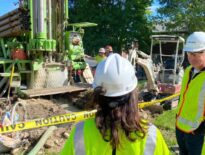
Alexis Walls
In November 2022, Massachusetts voters approved the Fair Share ballot question, which established a surtax on income above $1 million. The new surtax is estimated to raise between $1.4 to $2.2 billion annually with the new revenue dedicated to investments in public education and transportation. These new funds provide an opportunity for long-term, sustainable investments in transportation statewide, particularly in the 15 regional transit authorities (RTAs) that serve over 250 cities and towns across the commonwealth.
RTAs are a lifeline to those beyond the reach of MBTA bus and subway service, particularly for families who are low-income, older adults and people with disabilities, who rely on public transit to carry out day-to-day activities.
Although 55 percent of Massachusetts residents live in an RTA service area, state spending on RTAs only amounts to 7 percent of the total transportation funding for operations statewide. As a result, 40 percent of the state’s RTAs do not provide seven-day-a-week service and over half of RTAs do not provide service after 9 p.m, severely limiting the mobility of people that rely on them.

Pete Wilson
Using Fair Share dollars to expand RTA services is critical for the commonwealth to meet the needs of residents outside of Greater Boston and set the state on a path to realizing its climate goals.
A 2019 RTA Task Force Report recommended that the legislature implement a floor for minimum funding and tie increases to inflation. And the public agrees. Recent polling by the MassINC Polling Group revealed that 74 percent of Massachusetts residents support using Fair Share revenue to increase funding for RTAs and expand regional transit service statewide. Unlike the MBTA, which has a dedicated funding source from a percentage of the statewide sales tax, RTAs depend on annual funding appropriated by the legislature. This makes long-term planning for both maintaining and expanding service especially challenging for RTAs.
More Buses, More Benefits
Expanding RTA service statewide isn’t just about running more buses and increasing frequency, it’s about healthier communities.
A robust public transit system deepens connections within communities and strengthens the local economy. According to the MassINC poll, current riders primarily use the bus for errands (74 percent), healthcare (62 percent) and commuting to work (61 percent). A large percentage of non-riders said that they would like to use the bus to access nightlife (35 percent) and for day-to-day activities like errands (40 percent).
By providing more local transportation options, Massachusetts can increase opportunities for residents to thrive where they choose to live, work and raise their families.
Expanding RTA bus service into nights and weekends will reduce greenhouse gas emissions from transportation, which is the largest source of GHGs in Massachusetts.
Some RTAs have begun electrifying their bus fleets and additional sustainable state investments will provide the funding necessary for full electrification. And according to MassINC’s summary of its poll’s results, “More residents are aware of a bus stop near their home or work (56 percent) than they are of an electric vehicle charging station (38 percent).”
If Massachusetts is going to meet the benchmarks established by the climate legislation signed by Gov. Charlie Baker in 2021 and lower emissions set forth by the state’s Clean Energy and Climate Plan, it is critical that we use a multi-pronged strategy of electrifying our vehicle fleets as well as increasing our investments in public transportation.
Voters have sent a clear message to state leaders by approving the Fair Share Amendment. It is essential that this new source of revenue be used to strengthen transportation infrastructure, and RTAs are key in realizing a robust transit system that delivers for all residents.
The legislature is currently crafting the state budget for next year, and state leaders appear poised to make long-term, sustainable investments in regional transit, with Gov. Maura Healey, the House of Representatives and the Senate each proposing an increase in RTA funding in the fiscal year 2024 state budget through use of new surtax dollars. It is time for RTA communities to receive their fair share.
Alexis Walls is the assistant campaign director at the Massachusetts Public Health Association. Pete Wilson is a senior policy advisor at Transportation for Massachusetts (T4MA).





